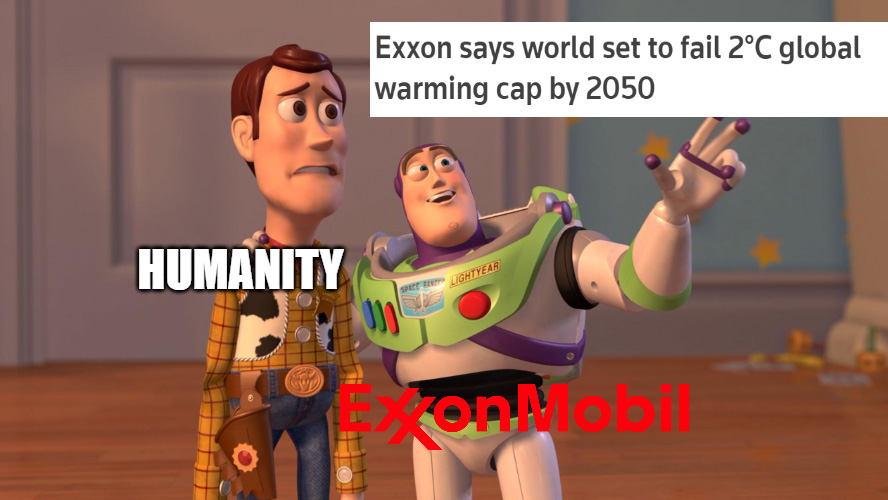Exxon Says We Will Fail to Meet Climate Goals. Why?
The Carbon Foundation – Published September 6th, 2023
Exxon Mobil wants you to give up in the fight against climate change. The oil giant has released its 2023 Global Outlook report which appeals to futility with a public statement saying 2050 climate goals will not be reached. This is right in line with the views of its shareholders who voted to reject emissions reduction goals in mid-2023 in favor of reaping record profits while the world heats up. Don’t let their greenwashed rhetoric fool you, Exxon remains the only large Western oil company without a 2030 target for reducing customers’ carbon emissions from its products.
As Reuter’s stated upon the release of Exxon’s yearly report, “Oil and natural gas are still projected to meet more than half of the world’s energy needs in 2050, or 54%, Exxon Mobil Corp said on Monday, with the world failing to keep global temperature increases below 2 degrees Celsius.”
By releasing a statement like this, Exxon Mobil wants you to believe they are helpless in fighting climate change. This is a logical fallacy known as the ‘Appeal to Futility’ in which one argues that it isn’t worth tackling a problem at all on the basis that it might not be solvable. There were points in which every major social and scientific problem in history appeared unsolvable but whether it was slavery, space travel, or vaccines, it paid off to keep working toward a solution.

A Toy Story-based meme that sums up the manipulative nature of Exxon’s statement. By KirkGlobalWitness via r/Anticonsumption
Exxon’s 9-page executive summary opens with a focus on how important energy is for humanity with dog whistles for fossil fuels like, ”Affordable and reliable energy is at the core of every key measure of human development.” Nowhere in the summary does it mention the human risk of catastrophic climate change. Exxon skirts a line in which they mention a need for reductions in fossil fuels or that renewables will play a role in emissions reduction but the actions of the company such as their complete refusal to invest in renewable energy make every such claim hollow. This balancing act signifies the strategy for the future of fossil fuel companies; use sustainability buzzwords and even call for climate action just enough to foster a better image while continuing business as usual with a few added greenwashing exhibitions. The oil giant raked in $413 billion in 2022 and has committed just $2.8 billion per year over 6 years, or less than 1% of its revenue in the fight against climate change. This meager sum amounts to the greenwashing wing of their marketing budget.
Input by Exxon in the climate issue must be met with skepticism, especially in the context of their early prediction and coverup of global warming. As Reuters reported on previously hidden internal Exxon documents,
“…Exxon scientists correctly dismissed the possibility of a coming ice age, accurately predicted that human-caused global warming would first be detectable in the year 2000, plus or minus five years, and reasonably estimated how much CO2 would lead to dangerous warming.”

A youth climate march contrasts the attitude of the next generation to the statement by Exxon. Photo by Tom Seger on Unsplash
In the end, an oil giant with a horrid track record on climate change should not be the one guiding us toward climate solutions or dictating the public’s sense of hope on the issue. The positive to this Exxon report is that it could be a wakeup call to fight harder to tackle climate change. While the motives behind the company may be slanted, the announcement that we are failing might be what we need to stand up to large fossil fuel companies like Exxon and other major climate contributors.
